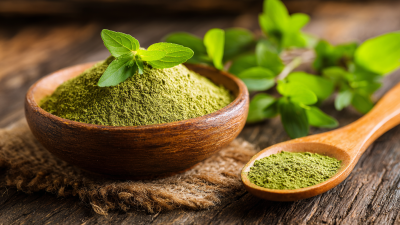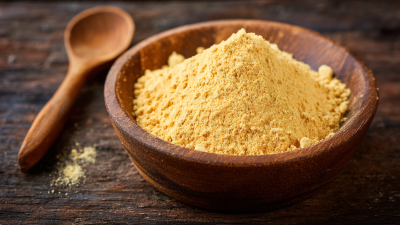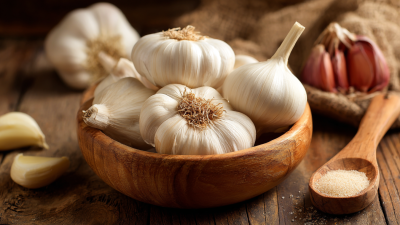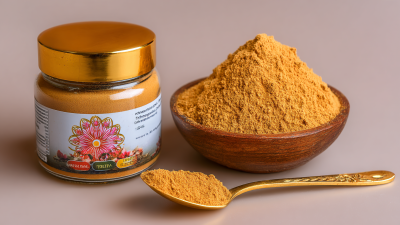Evaluating the Efficacy: Ginkgo Biloba Extract vs. Other Herbal Supplements for Cognitive Health
In recent years, the quest for cognitive health has led to an increasing interest in various herbal supplements, with Ginkgo Biloba Extract emerging as a prominent candidate. A report by the National Center for Complementary and Integrative Health indicates that close to 20% of older adults in the U.S. have used herbal products, with Ginkgo Biloba being one of the most popular for improving memory and mental sharpness. Studies show that Ginkgo Biloba Extract may enhance cognitive function, particularly in individuals with age-related cognitive decline, yet its efficacy compared to other herbal alternatives remains a critical discussion point. With the global herbal supplement market projected to reach $111.2 billion by 2027, understanding the efficacy of Ginkgo Biloba Extract versus other options in promoting cognitive health is imperative for consumers seeking effective solutions for mental wellness. This blog will delve into a comprehensive checklist evaluating the comparative benefits, potential side effects, and scientific backing of Ginkgo Biloba Extract alongside other herbal supplements.

Understanding Ginkgo Biloba: Origins and Traditional Uses for Cognitive Health
 Ginkgo biloba, one of the oldest living tree species, has a rich history rooted in traditional medicine, particularly in enhancing cognitive health. Originating from China, its leaves have been used for centuries in herbal remedies aimed at
improving memory and concentration. Research suggests that ginkgo biloba might exert neuroprotective effects due to its high antioxidant content, which is believed to mitigate oxidative stress—one of the contributors to cognitive decline. A study published in "Psychopharmacology" indicated that consumption of ginkgo extract may improve working memory in healthy older adults, highlighting its potential as a supplement for cognitive health (Schmidt et al., 2015).
Ginkgo biloba, one of the oldest living tree species, has a rich history rooted in traditional medicine, particularly in enhancing cognitive health. Originating from China, its leaves have been used for centuries in herbal remedies aimed at
improving memory and concentration. Research suggests that ginkgo biloba might exert neuroprotective effects due to its high antioxidant content, which is believed to mitigate oxidative stress—one of the contributors to cognitive decline. A study published in "Psychopharmacology" indicated that consumption of ginkgo extract may improve working memory in healthy older adults, highlighting its potential as a supplement for cognitive health (Schmidt et al., 2015).
Furthermore, ginkgo biloba’s efficacy is often compared with other herbal supplements widely used for cognitive enhancement, such as Panax ginseng and Bacopa monnieri. A systematic review in the "Journal of Ginseng Research" found that ginkgo biloba showed promising results in increasing attention span and cognitive speed, outperforming some of its herbal counterparts (Hwang et al., 2019). The growing trend in herbal supplement use highlights the need for standardized quality control and further research into the mechanisms by which ginkgo biloba and similar herbs impact brain health. As more people turn to nature-based options, understanding these traditional uses becomes crucial in making informed choices for cognitive support.
A Comprehensive Review: Comparing Ginkgo Biloba with Popular Herbal Supplements
In recent years, the demand for herbal supplements aimed at enhancing cognitive function has surged. Among these,
Ginkgo Biloba extract has garnered significant attention for its potential neuroprotective benefits.
A study from the Journal of Alzheimer's Disease revealed that Ginkgo Biloba, renowned for its ability to improve blood flow to the brain,
may reduce the risk of cognitive decline by up to 30% in older adults.
This statistic reinforces its position as a leading natural supplement for those seeking to boost mental acuity.
When compared to other popular herbal supplements like Ginseng and
Bacopa Monnieri, the efficacy of Ginkgo Biloba appears notable.
Research published in the Nutrients journal indicates that while
Ginseng can enhance energy levels and reduce fatigue, it does not directly target cognitive health as effectively as Ginkgo.
In contrast, Bacopa Monnieri has been shown to enhance memory formation and retention, but its benefits typically require long-term use,
which can be a drawback for those seeking immediate results. Thus, the comparison demonstrates that while various herbs offer unique benefits,
Ginkgo Biloba stands out for its quick cognitive support
and its extensive backing from clinical studies.
Clinical Research Insights: Efficacy of Ginkgo Biloba in Cognitive Enhancement
Ginkgo Biloba has long been hailed as a natural remedy for cognitive enhancement, but how does it truly stack up against other herbal supplements? Recent clinical research sheds light on its efficacy, revealing both promise and limitations. Studies focusing on Ginkgo Biloba have shown mixed results in improving memory and cognitive function, particularly in older adults experiencing cognitive decline. However, the herb's antioxidant properties and ability to improve blood circulation may contribute to enhanced brain health, which is a vital component in the overall discussion of cognitive enhancement.
In comparison to other popular herbal supplements like Panax ginseng and Bacopa monnieri, Ginkgo Biloba's unique biochemical profile offers distinct advantages. While ginseng touts energy-boosting properties, Bacopa is recognized for its potential in reducing anxiety and improving memory retention. Research indicates that Ginkgo may work best in a synergistic approach alongside these other supplements, potentially leading to more comprehensive cognitive benefits when combined strategically. As the landscape of herbal nootropics continues to evolve, understanding the specific applications and interactions of these supplements will be essential for optimizing cognitive health.
Evaluating the Efficacy of Ginkgo Biloba Extract vs. Other Herbal Supplements for Cognitive Health
This chart compares the effectiveness of Ginkgo Biloba extract against other popular herbal supplements based on clinical research insights. The efficacy scores are derived from various studies focused on cognitive enhancement.
Side Effects and Interactions: Ginkgo Biloba vs. Other Herbal Alternatives
When considering herbal supplements for cognitive health, Ginkgo Biloba often stands out due to its long history of use and a plethora of studies supporting its efficacy. However, users should be aware of its potential side effects and interactions with other medications.
Common side effects of Ginkgo Biloba include gastrointestinal upset, headaches, and dizziness. More concerning is its potential to increase bleeding risk, particularly when taken alongside anticoagulants or anti-inflammatory medications. This interaction becomes critical for individuals on blood thinners, as it may lead to severe complications.
In comparison to Ginkgo, other herbal alternatives such as Ginseng and Bacopa Monnieri also present benefits for cognitive enhancement but come with their own profiles of side effects. Ginseng may cause insomnia and headaches, while Bacopa could lead to digestive issues. Understanding these nuances in side effects and interactions is essential for making informed choices about cognitive health supplements.
Before starting any new herbal regimen, it's prudent to consult healthcare professionals, especially for those taking multiple medications or with pre-existing health conditions.
Choosing the Right Supplement: Factors to Consider for Optimal Cognitive Support
When selecting a herbal supplement for cognitive health, several factors should be taken into consideration to ensure efficacy and safety. One important aspect is the quality of the extract. According to a study published in the "Journal of Dietary Supplements," varying levels of active compounds in herbal products can significantly influence their effectiveness. For instance, while Ginkgo Biloba is often lauded for its potential to enhance memory and cognitive function, not all extracts are created equal. A standardized extract containing 24% ginkgo flavone glycosides is recommended for optimal results, as highlighted by research from the National Center for Complementary and Integrative Health.
Additionally, individuals should consider their unique health conditions and medications when choosing a supplement. The "Cognitive Function and Herbal Supplements: A Review" report indicates that certain supplements can interact with pharmaceuticals, potentially compromising cognitive benefits or causing adverse effects. For example, Ginkgo can thin the blood, which may pose risks for those on anticoagulant medications. Therefore, conducting thorough research and possibly consulting a healthcare professional can help tailor a supplement regimen that aligns with personal health goals and ensures optimal cognitive support.


About Us
Products
Nutraceuticals
Botanical Extracts
Berberis Extract
Ginkgo Biloba Extract
Rutin
Quercetin
Grape Seed Extract
European Bilberry Extract
Broccoli Seed Extract
Fisetin
Ajuga Extract
Resveratrol
Stevia Leaf Extract
Green Tea Extract
Olive Leaf Extract
Epimedium Extract
Rhodiola Rosea Extract
Panax Ginseng Extract
Pomegranate Extract
Garlic Extract
Milk Thistle Extract
Black Pepper Extract
Fruit & Vegetable Juice Powder
Customized Service
News
Blog
Contact Us

 Ginkgo biloba, one of the oldest living tree species, has a rich history rooted in traditional medicine, particularly in enhancing cognitive health. Originating from China, its leaves have been used for centuries in herbal remedies aimed at
Ginkgo biloba, one of the oldest living tree species, has a rich history rooted in traditional medicine, particularly in enhancing cognitive health. Originating from China, its leaves have been used for centuries in herbal remedies aimed at






